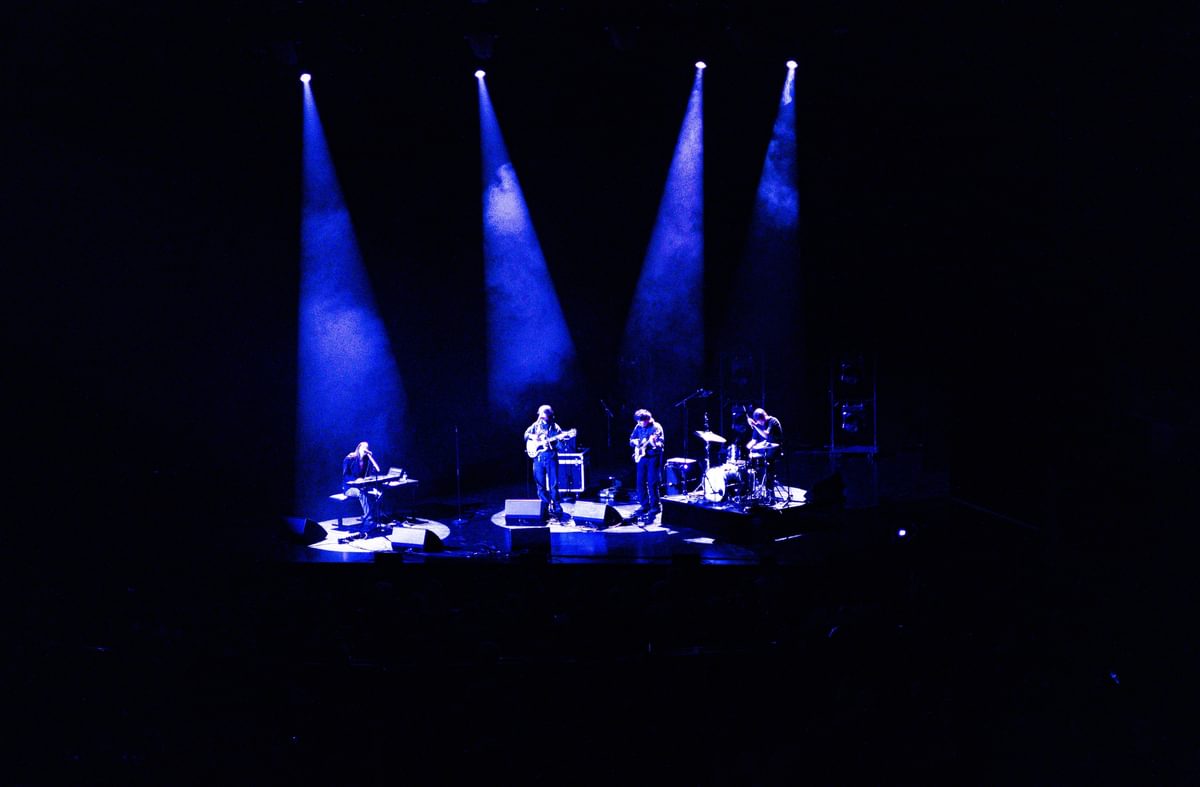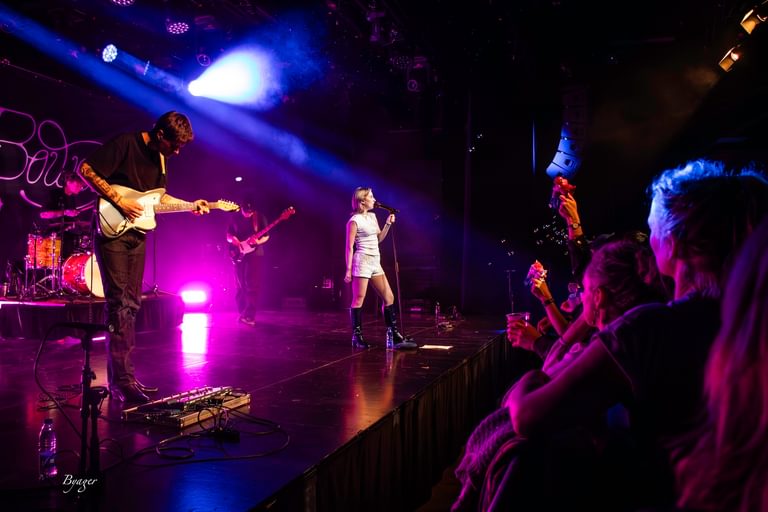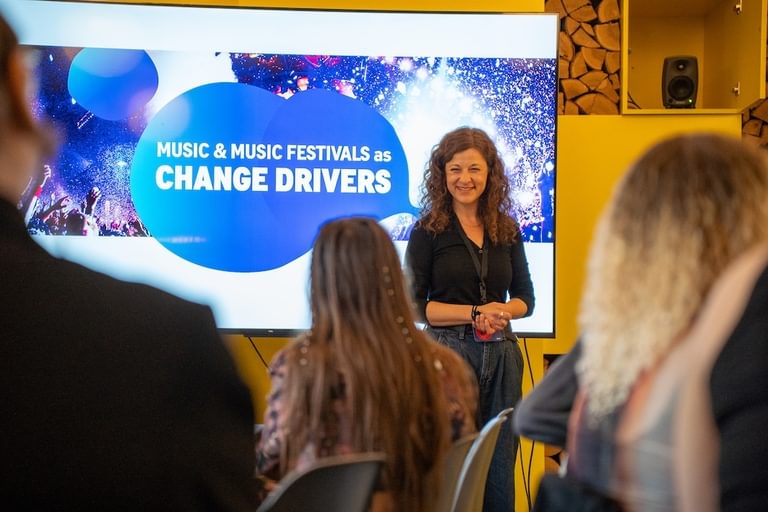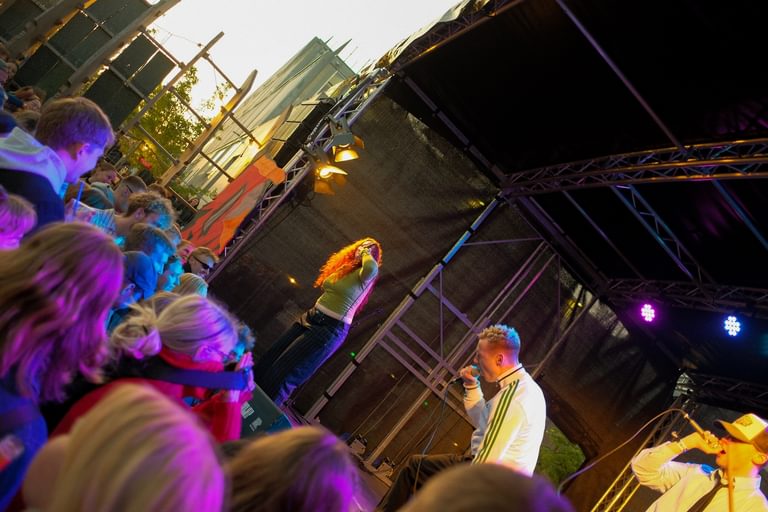
Denmark’s SPOT Festival is still the ultimate music playground
Lead photo of Fine by Ece Nur Kilic
Best Fit spends 48 hours in Denmark’s second city at SPOT Festival – a showcase that finds the perfect balance between industry and fun, and proves that Nordic music is in a very healthy place right now.
SPOT is definitely not a new kid on the block. Denmark’s own spin on SXSW turns 30 this year and is one of the oldest public music festivals in the country. We came here almost a decade back and the Covid years didn’t manage to derail the evolution and quality of the Aarhus-based event, which packs more incredible music in two days than feels humanly possible.
SPOT transforms downtown Aarhus into a mini-carnival for 10,000 people each day, with music seemingly everywhere thanks to a handful of outdoor stages that bleed noise of all kinds pleasantly across the day and well into the late night. More than 200 acts will play across 24 venues at an event that’s had more than enough time to find its feet and grow up along with its home. While the core of the music is firmly rooted in Scandinavia, SPOT’s programming - which stretches from the intelligently commercial to the insanely experimental - seems to connect at all ages.
Half the size of Copenhagen in both land and population, Aarhus has a freshness and serenity to it – think Bristol or Brighton but with the usual Scandi twists. The coffee is amazing, the streets are clean, and bikes outnumber cars—stacked against apartment walls like firewood. The population of Denmark’s second city is younger than the capital and it shows: at every performance, the entire crowd dances. Everyone cheers and everyone is grinning from ear to ear. They don’t call this the “city of smiles” without reason.

On the opening day of the event I catch four-piece Speedrun, who are decked out like a Danish Devo and play frenetic, space jazz interpretations of what could be the Outrun soundtrack. The boilersuit-clad quartet get a lot of love from the crowd, with the same young faces popping up at shows from the infinitely more commercial Emily Bowen and Carlina de Place – sonically a world away. 100%WET's self-styled "hypergaze" sound flexes the harder moments of Grimes' Art Angels through MBV-style pedals and adds baggy breakbeats and 303s. The Danish duo is signed to legendary indie Crunchy Frog – who picked up Junior Senior back in the day and celebrated their own thirtieth anniversary last year. The label also stages a cute spin-off event during the day with free pizza and sets from three of its signings – 100%WET stripped back to fit a restaurant corner is no less impressive.
Icelanders Inspector Spacetime are here playing their first overseas festival at the Institute of (X). Firmly rooted in 90s and 00s aesthetics, the Reykjavík dance-party band mash up SOPHIE’s glitch with 2 Unlimited’s eurodance, French disco and a little bit of Confidence Man. It's about as high energy as you might imagine from arguably the best live band in Iceland right now, riding high as the breakout stars of last year’s Airwaves. The four-piece walk out to an audience who already know their music and deliver one of the festival’s most frenetic sets to happily drunk and very, very appreciative Danes. “We weren’t expecting so many people at all,” singer Egill Sigurjónsson tells me later. “We just wanted to try and have the best time. The crowd really showed up and brought one of the best atmospheres we have seen at one of our shows.”
The Institute of (X) itself is one of Aarhus’ most exciting developments: a makeshift, pop-up community of artists, entrepreneurs and craftsmen who work side by side in a former customs building in the district of Godsbanen—a former freight railway hub – and the surrounding lands. In this Christiania-like space, SPOT has two stages this weekend – alongside bakeries, bars, brewers, baristas and musicians who anchor their projects in this intensely creative space. Everything is aimed at facilitating cultural and creative grassroots initiatives in Aarhus – to help create a ‘good city for all’ – with a special focus on social environments.

SPOT is also investing in the next generation of talent interested in working in the music industry through an intensive development program called SPOT:NEXT. A cohort of 50 early-career music industry hopefuls are given access to online workshops, networking events, and exclusive experiences before, during, and after the festival – aimed at providing the insight, experience and connections to help them take their first steps. “Having the resources and opportunity to bridge the gap between the established industry and new talents is a gift and we hope that SPOT:NEXT can open the door for more diversity in the industry and provide a pathway for emerging professionals,” explains SPOT director Rikke Andersen.
Andersen – a former venue manager – took over SPOT last year as the first new leader in its history. She was a student in Aarhus back in the noughties and her time running the 700-capacity club venue Fermaten in Herning – an hour west of Aarhus – has been vital in her approach to SPOT. “It’s always been my all time favourite festival,” she tells me. “And I just love it so much but at the same time, I think the industry is ready for some change – there's a new generation waiting to enter the music industry – and I would very much like SPOT to be the place that can open the doors for the for the younger generation.”
Andersen credits the city and its people as another factor in its longevity: “This is just a very young city - it’s not as rowdy as Copenhagen and people are not getting drunk in the way they do at other festivals: they come to hear the music.” SPOT’s always managed to keep the focus on the music, she emphasises – and that’s ultimately been the key to its survival. “It’s always been a place to find the next big thing, bands that are becoming bigger.”

While not a commercial mega-festival like Roskilde, SPOT’s influence has been notable in helping artists gain visibility beyond their home markets.The Raveonettes, MØ, Mew, Trentemøller and Efterklang all got leg up from playing at SPOT, while Icelanders Sigur Ros and Múm came here for early shows too. It’s no stretch to think that Copenhagen singer-songwriter and producer Fine Glindvad might be the next breakout. A graduate of the Danish capital’s free-to-attend Rhythmic Music Conservatory – whose alumni includes ML Buch, Molina and Glindvad’s collaborators Astrid Sonne and Erika de Casier – she’s here a few days after the UK debut of Coined, her side-project with Sonne.
Glindvad’s Rocky Top Ballads was her first solo work after a decade with CHINAH – who we saw here a decade ago playing their first show – and was one of last year’s most underrated records. Live, her voice is given extra dimensionality of both depth and nuance, dripping with languid, hazy melancholy — it's both enchanting and visceral. She’s making music that suffuses melody and mood, filling the vast 1600-capacity room at Musikhuset with ease and turning in one of SPOT’s tentpole performances.
At the other end of the building in the Rytmisk Sal, I find Yorkshire-born composer Matthew Grouse and his new project with the Århus Sinfonietta. Titled “A very exciting product launch”, there’s a quintet facing a screen which displays the entirely made-up Ensemble Kontrol 2 – a voice-activated device that seems to let the audience control the performers via voice commands delivered through a roving microphone. Grouse – who works at the intersection between instruments, voices, electronic sound and performance – hides behind a curtain, only emerging at the end when the who charade goes into meltdown in a fun bit of theatre. It’s absurd and filled with playfulness and that’s kind of the point – an apt sentiment that feels entirely at home in this wonderful space and at SPOT as a whole.
Find out more at spotfestival.dk
Get the Best Fit take on the week in music direct to your inbox every Friday

OSKA
Refined Believer

Tropical F*ck Storm
Fairyland Codex

Loyle Carner
hopefully !





